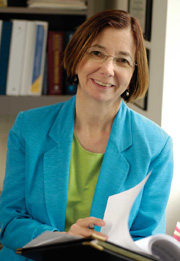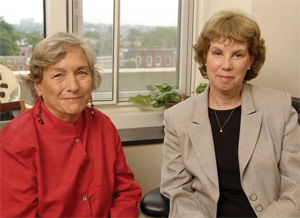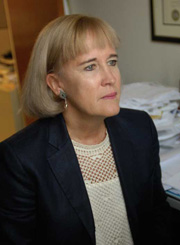Written by Sarah Achenbach
Illustrations by Linda Fountain
Photos by Will Kirk

For nurses in today’s ever-evolving health care environment, learning doesn’t end at graduation. Through innovative continuing education offerings and unparalleled advanced academic programs, the School of Nursing offers ongoing opportunities to gain new knowledge.
After 19 years in the Johns Hopkins Hospital Emergency Room, Michelle Whitfield, RN, figured she’d seen just about everything. Nothing, though, compares to what she experienced during her two-week stint as a volunteer nurse in a post-Hurricane Katrina New Orleans.
Whitfield was one of 12 Hopkins personnel selected to join the first of two Maryland delegations dispatched to Louisiana in the days following the devastating storm in 2005. The group was deployed to Westwego, a parish about 10 minutes from New Orleans, to set up a community health clinic in a local elementary school. Whitfield, an emergency acute care nurse manager at Johns Hopkins Hospital, and her colleagues treated psych patients, people with chronic diseases who had run out of medication, and those with medical issues from stagnant water.
“People really needed us to be a human being with them and listen to them in the midst of this horrific thing,” says Whitfield. “The human spirit can take so much, but it can give so much, too.” She recalls the bilateral amputee who wheeled himself seven blocks through storm debris to let clinicians know that his neighbor was out of insulin. Or the school’s janitor, his own home damaged from high winds, who had coffee waiting every morning when the medical team arrived and was the last to leave each night.
Whitfield returned to Baltimore and Johns Hopkins recommitted to a career in emergency medicine and wanting to be better prepared for any future disasters. Last January, she found the training she’d been looking for through the Nursing in Global Humanitarian Relief continuing education course offered through the School of Nursing’s Institute for Johns Hopkins Nursing (IJHN).
The week long course, co-sponsored by IJHN, School of Nursing, and the Center for Refugee and Disaster Response at the Johns Hopkins University Bloomberg School of Public Health, offered Whitfield and the other attendees intensive training in providing health care interventions during humanitarian emergencies. She even got the opportunity to share her Hurricane Katrina experience on a panel during the week. “The speakers were top-of-the-line and the program was very detailed,” says Whitfield of her first IJHN course. “I took away real tools that I can use now and later.”
The Nursing in Global Humanitarian Relief course is just one of more than 50 programs offered annually by IJHN. Over the past decade, IJHN’s continuing education programs have reached some 750,000 nurses nationally and internationally through academies, conferences, workshops, publications, and distance learning.

“Our goal is to take the best practices in nursing and use continuing education as an avenue to share that,” says Jane Shivnan, RN, MScN, AOCN executive director of IJHN since 2006. “With programs like our Nurse Manager Academy, we’re filling real needs that aren’t being met elsewhere. We give nurses tools they can take home and use the next morning at work. What sets us apart is innovative, highly interactive teaching that engages the participant in learning.”
More than ever, Shivnan says, nurses need to view their working lives as ongoing opportunities for learning. “Health care is changing faster than at any point in modern history, with new technology and growing research emphasizing the roles that nurses and other professions play in patient safety.” Challenges come from both an ever-evolving work environment where fiscal pressures demand nurses be as well-versed in the bottom-line as they are in patient care, and from health care crises brought on by world events like 9/11 and Hurricane Katrina. Notes Whitfield, “Our profession has really blossomed, and we’re gaining knowledge through these types of programs.”
Addressing the working nurse’s need for flexibility and accessibility is essential when creating high-quality, cutting-edge continuing education courses and academic degree programs. IJHN programs are as short as the First Friday Lunch Series (hour-long lectures featuring members of the Johns Hopkins research community), and as extensive as the three-week, online Fundamentals for the Research Coordinator course, which trains research nurses and coordinators on all aspects of grant management, from applications to study protocol and data management. With the exception of the Global Humanitarian course which offers three credits that may be applied toward the SON Master of Science in Nursing/Master of Public Health (MSN/MPH) program, IJHN courses are outside of academic programs and are designed as continuing nursing education.
Each year, Shivnan and her staff add new programs in response to requests and to meet the needs of the nursing profession. “This year, we’re running our first Advanced Nurse Manager Academy, a new Informed Consent Program, and the Emergency Preparedness and Disaster Relief course will expand to include a day focused on pandemics,” says Shivnan.
IJHN began as a partnership between the school and Johns Hopkins Hospital to create continuing education programs that would develop both nurses’ leadership skills and clinical expertise. To present such comprehensive programs geared to the working nurse and to take full advantage of Hopkins’ intellectual capital, IJHN collaborates with other Hopkins departments and outside organizations. The institute’s Sexual Assault Forensic Nurse Examiner Program, for instance, is presented in cooperation with the Maryland Coalition Against Sexual Assault. For its Advanced Studies in Nursing program, IJHN frequently works in conjunction with Hopkins’ Office of Continuing Medical Education to offer courses in an array of specialties, such as Addiction Medicine, Infectious Disease, Neurology, and Psychiatry.

The Nursing in Global Humanitarian Relief course was created by the school’s public health nursing faculty and by faculty from the Bloomberg School of Public Health. It is an IJHN offering, an elective for the school’s joint MSN/MPH degree, and a required course for the Emergency Preparedness and Disaster Relief certificate program. Many of the course lecturers are Bloomberg School faculty, who have extensive firsthand experience in humanitarian emergencies—exactly the type of background MSN/MPH students want. “Many of our graduates will work or volunteer internationally and wanted tools that would be useful specifically for nurses,” notes School of Nursing assistant professor Sara Groves, DrPH, APRN, BC, who developed the course with associate professor Joan K. Kub, PhD, APRN, BC. The weeklong course offers participants an intellectual partnership of sorts, melding different perspectives, says Groves. She notes that MSN/MPH students typically have a public health background, while IJHN attendees tend to have curative/hospital-based skills and knowledge and are interested in volunteering during a humanitarian emergency.
“All of our MSN tracks respond to what’s going on in a complex health environment,” says Kathleen White, PhD, RN, CNAA, BC, who became director of the MSN program in August 2006. “Our Clinical Nurse Specialist Forensic Nursing Focus is one of the first in the country. Our MSN/MPH is ranked second in the United States, with our students doing clinical practicum as close as East Baltimore and as far as Africa.” Rather than hand each student a tired list of placements for the required practicums, White says the sky’s the limit. “If the student has a desire to do something, and we can make it happen, we do.” (See “Partners in Learning”)

While the school’s BSN program has a far-flung applicant pool, the MSN program tends to pull from the working nurses at Johns Hopkins, other area hospitals, and the National Institutes of Health. The majority of students—75 percent of all 2006-2007 MSN students—work full time while completing their graduate studies.
That’s exactly what Debbie Doering, MSN, CNS, RN, did after receiving her BSN from the school’s Accelerated Program. A former financial consultant with A.G. Edwards in Annapolis, Doering first became interested in nursing in the most difficult of circumstances: sitting in the recovery room after her husband’s open heart surgery, first in 1988 and again in 1995. It took a little time for her passion to meet the pavement, but in 2002, she graduated from the accelerated program at the age of 39.
Two years later, her husband died of an abdominal aortic aneurysm. “I really had to think about what I wanted to do with my life,” she explains. “I had always planned on becoming an Adult Acute/Critical Care Nursing Practitioner (ACNP), but decided I wanted to do something else.” A fan of television’s CSI: Crime Scene Investigation, Cold Case, and other forensics-focused shows, Doering loved the combination of the medical and legal fields. She was happy to discover that her alma mater offered the MSN/CNS-Forensic Focus degree—and even more delighted that the coordinator was renowned forensic nursing expert Dan Sheridan, PhD, RN, CNS, FAAN. She enrolled full time in September 2005.
Initially, she continued to work in the St. Joseph’s CSU, but then she switched to agency nursing for its greater flexibility in scheduling around papers and exams—and for the additional experience at other hospitals. Doering scheduled her work around weekday classes and exams and kept her procrastination in check. “There’s no denying that the MSN program is challenging, but I did not find it difficult to juggle both school and work as long as I stayed focused,” says Doering, who also found time to squeeze in a social life, remarrying in August 2006. “I worked on papers early in the semester so that I wasn’t trying to write a 20-page paper in a day or two. For those classes in which I had exams, I reviewed the information every night and utilized the resources at work to explain difficult concepts.”
Doering’s mentoring relationship with Sheridan also opened the door to her current job as forensic nurse consultant in the Oregon Department of Health Services Department of Investigation and Training. She was offered the position last August, two days after her wedding in Oregon. Doering telecommuted until she and her husband moved from Maryland to Oregon this past spring. With her primary interests in suspected abuse and neglect, death investigation, and documentation, Doering reviews cases and teaches training courses. She’s currently developing programs to educate nurses on proper documentation and is working with local institutions and attorneys to provide consulting services.
As a working nurse attending graduate school, Doering’s experience is the norm at Hopkins, and White and her colleagues are exploring creative ways to address the juggle—and sometimes struggle—when both career and school are demanding. In what she describes as a “real step forward,” White notes that beginning last year, core MSN courses are now offered on a rotating basis. “We’ve created a block schedule of classes so that nurses can take two to three classes per day and take one day off per week,” White explains. “Students told us that they needed the consistency to take off the same day each week from their job.” To accommodate days off to attend classes, most part-time students choose to work three 12-hour shifts each week, she says.
While the MSN program and IJHN meet different needs for the working nurse, White is adamant that both are extremely important. “Through IJHN’s Office of Global Nursing, we’re able to offer more international experiences for our students, which is a huge complement to the MSN program,” notes White. And whether it’s across the country or around the globe, the Johns Hopkins name carries clout and opens doors for nurses. “Again and again, I hear from alumni how much the Johns Hopkins University School of Nursing degree has helped,” says Mary O’Rourke, director of SON Admissions. “People hear ‘Hopkins’ and say, ‘When can you start?’ Our students know that they are going to work their tails off here, but they also know the quality of education they get.”